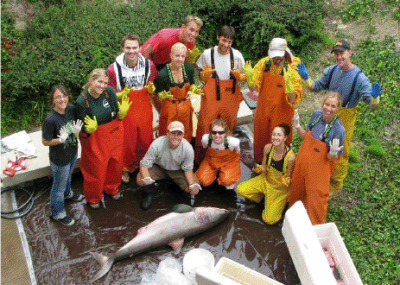Dr. Chris Lowe

The CSULB Shark Lab was originally founded by Dr. Donald R. Nelson (a founding member of AES) in 1969, with a primary focus on the study of elasmobranch behavioral ecology. Don was a pioneer in the development and application of acoustic telemetry techniques used to study elasmobranch behavior and trained a notable cast of students who carry on his research legacy (e.g., Tim Tricas, Peter Klimley, Rocky Strong, Ed Standora, Chris Lowe).
The CSULB Shark Lab is still dedicated to the study of physiological and behavioral ecology of elasmobranchs and other gamefishes, and acoustic and satellite telemetry are still primary tools of the lab. Since taking over the lab in 1998, Dr. Chris Lowe and his students have worked on a wide range of species and topics. Considerable work has been done on the highly abundant round stingray (Urobatis halleri), examining movement patterns (Jeremy Vaudo), age and growth (Lori Hale), spine regeneration (Petra Johannson), thermoregulation (Kate Jirik), reproductive biology and endocrinology (Chris Mull), genetics (Susanne Plank), organochlorine contamination (Kady Lyons), and interactions with humans. Dr. Lowe and his students have conducted research on the digestive physiology and foraging ecology of sharks using novel tools like gastric pH dataloggers to quantifying feeding periodicity in leopard, nurse and blacktip reef sharks (Yannis Papastamatiou). Southern California is a highly urbanized area where the effects of 20 million people have resulted in significant impacts to coastal marine environments through shoreline development, pollution and overfishing. Dr. Lowe and his students have used a variety of tools to quantify how local elasmobranchs used restored estuarine areas (Mario Espinoza and Thomas Farrugia) as well as the effects of organochlorine and metal contaminants on sharks and rays (Kady Lyons, Mary Blasius, and Chris Mull). Most recently, they have collaborated with Monterey Bay Aquarium (John O’Sullivan and Kevin Weng) and Oscar Sosa-Nishizaki (CICESE) to study the behavior and ecology of juvenile white sharks in southern California and Baja, Mexico. Dr. Lowe is also collaborating with researchers at Cal Poly San Luis Obispo to develop smart AUVs capable of tracking tagged sharks and simultaneously characterizing environmental conditions.
For more information on the CSULB Shark Lab, please visit their website: www.csulb.edu/web/labs/sharklab/